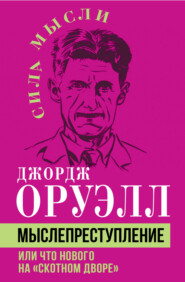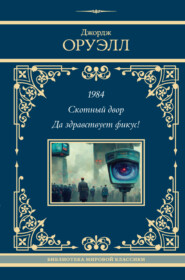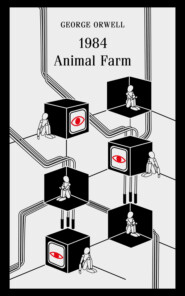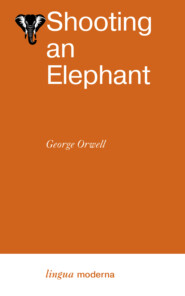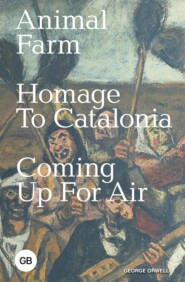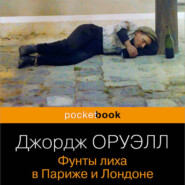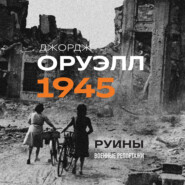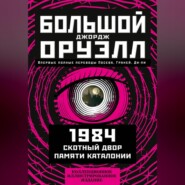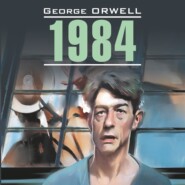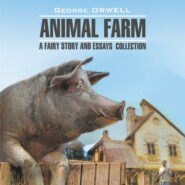По всем вопросам обращайтесь на: info@litportal.ru
(©) 2003-2025.
✖
1984. A2
Настройки чтения
Размер шрифта
Высота строк
Поля
1984. A2
George Orwell
English Classics: Graded Readers
«1984» – роман-антиутопия, написанный Джорджем Оруэллом, который изображает тоталитарное будущее, где государство полностью контролирует все аспекты жизни людей. Действие происходит в вымышленной стране Океания, где правящая партия во главе с Большим Братом использует жестокие методы подавления свободы, постоянного наблюдения и контроля за сознанием граждан.
Главный герой, Уинстон Смит, работает в Министерстве Правды, где его обязанность – искажение исторических фактов в соответствии с пропагандой партии. Однако Уинстон начинает сомневаться в идеологии и порядке, в котором живет, и пытается восстать против системы. Роман исследует темы тоталитаризма, пропаганды, контроля над сознанием, манипуляции историей и языком, а также потери индивидуальной свободы.
«1984» предупреждает об опасности авторитарных режимов и показывает, как власть может уничтожать не только свободу действий, но и способность людей мыслить самостоятельно.
Текст романа адаптирован под уровень А2 и снабжен глоссарием. Также в книге есть упражнения для проверки своих знаний и понимания прочитанного.
Джордж Оруэлл
1984. A2
© Темурян К. Т., адаптация, словарь, упражнения, 2024
© ООО «Издательство АСТ», 2024
Part one
Chapter 1
It was a cold, bright day in April. Winston Smith hurried through the glass doors of Victory Mansions to avoid the cold wind. The wind blew dust and small pieces of paper through the streets.
The corridors smelled of boiled cabbage and old carpets. There was a huge coloured poster on the wall. It showed a man's strong face with dark eyes and a thick black moustache. The face stared down at everyone, like it was watching them. Below the man's face, there was a phrase: BIG BROTHER IS WATCHING YOU.
Winston took the stairs to get to his flat on the seventh floor. The lift, as usual, wasn't working because the Party often turned off the power during the day to save energy for Hate Week. When Winston finally reached his flat, he opened the door and entered. A loud voice came from a large screen on the wall. The telescreen showed programmes, but also controlled everything that happened in the room. The rule was to never turn it off.
Winston looked out of the window. Below him, the streets were empty, except for the posters of Big Brother that hung everywhere. Helicopters flew low over the rooftops, looking into people's windows to check what they were doing. In the distance, there were enormous buildings: the Ministry of Truth, responsible for news, education, and art; The Ministry of Peace, responsible for war; The Ministry of Love, responsible for law and order; and the Ministry of Plenty, responsible for economic affairs.
Winston wrote down the date in his diary. His handwriting was messy, and he made many mistakes. He wrote about his memories, and another one came to mind.
In the Records Department, where Winston worked, people were getting ready for Hate. He spotted two people. One of them was a girl with freckles on her face. Winston immediately disliked her: he believed she was more dangerous than others. The other person was a man named O'Brien. He worked for the Party, and the room got quiet when he walked in.
The face of Emmanuel Goldstein appeared on the screen. In the past, Goldstein was one of the Party leaders – along with Big Brother – but later betrayed him, escaped, and disappeared. The room got loud: everyone was angry. The whispers in the audience soon became shouts, and someone threw a Newspeak dictionary at the screen. For a moment, Winston's hatred towards Goldstein shifted into hatred towards Big Brother.
Winston looked at his writing again. The handwriting was no longer awkward, and he felt he was writing words down automatically: DOWN WITH BIG BROTHER. He felt fear: the Thought Police would start looking for him. They usually arrested people at night.
Suddenly, there was a knock on his door. Were they here? Already! The knocking continued. Winston's heart was beating loudly as he got up from his chair and moved towards the door.
Glossary
affair [ə'feə] – n дело
awkward ['ɔ:kwəd] – adj неуклюжий
betray [bɪ'treɪ] – v предавать
dust [dʌst] – n пыль
escape [ɪ'skeɪp] – v сбежать
freckle ['frekl] – n веснушка
handwriting ['hændˌraɪtɪŋ] – n почерк
hang (hung, hung) [hæŋ] – v вешать, висеть
hatred ['heɪtrɪd] – n ненависть
helicopter ['helɪkɒptə] – n вертолет
hurry ['hʌri] – v спешить
peace [pi:s] – n мир, покой
plenty ['plenti] – n изобилие
responsible [rɪ'spɒnsəbl] – adj ответственный
rooftop ['ru:ftɒp] – n крыша
shift [ʃɪft] – v изменяться
spot [spɒt] – v замечать
stare [steə] – v пристально смотреть
whisper ['wɪspə] – n, v шепот, шептать
Chapter 2
When Winston reached the door, he realised that the notebook was still on the table. He left it open, anyone could see “DOWN WITH BIG BROTHER”. The letters were big enough to see it from here. He inhaled and opened the door. It was Mrs. Parsons, his neighbour.
“Can you please take a look at the kitchen sink? There's a problem with it, and my husband isn't home.”
Mr Parsons worked with Winston. He was overweight, energetic, and incredibly stupid, but Mrs. Parsons appreciated his skills.
Winston followed her into the old flat, which smelled of boiled cabbage and sweat. The place was messy, as if wild animals ran around the rooms all day. Winston started working in the sink.
“Hands up! You're a traitor! A thought-criminal! A spy! I'll shoot you!” someone shouted from behind.
Mrs. Parsons' children jumped around Winston with their toy guns, but for Winston, they felt real. Mrs. Parsons apologised for the noise nervously and thanked Winston. Her grey face looked helpless and frightened. As he was leaving, one of the boys threw a toy gun at him.
“Goldstein!” the boy screamed. Mrs. Parsons apologised again. She looked older than she was.
Back at his flat, the telescreen spoke loudly. “Attention! There's news from the war!”
George Orwell
English Classics: Graded Readers
«1984» – роман-антиутопия, написанный Джорджем Оруэллом, который изображает тоталитарное будущее, где государство полностью контролирует все аспекты жизни людей. Действие происходит в вымышленной стране Океания, где правящая партия во главе с Большим Братом использует жестокие методы подавления свободы, постоянного наблюдения и контроля за сознанием граждан.
Главный герой, Уинстон Смит, работает в Министерстве Правды, где его обязанность – искажение исторических фактов в соответствии с пропагандой партии. Однако Уинстон начинает сомневаться в идеологии и порядке, в котором живет, и пытается восстать против системы. Роман исследует темы тоталитаризма, пропаганды, контроля над сознанием, манипуляции историей и языком, а также потери индивидуальной свободы.
«1984» предупреждает об опасности авторитарных режимов и показывает, как власть может уничтожать не только свободу действий, но и способность людей мыслить самостоятельно.
Текст романа адаптирован под уровень А2 и снабжен глоссарием. Также в книге есть упражнения для проверки своих знаний и понимания прочитанного.
Джордж Оруэлл
1984. A2
© Темурян К. Т., адаптация, словарь, упражнения, 2024
© ООО «Издательство АСТ», 2024
Part one
Chapter 1
It was a cold, bright day in April. Winston Smith hurried through the glass doors of Victory Mansions to avoid the cold wind. The wind blew dust and small pieces of paper through the streets.
The corridors smelled of boiled cabbage and old carpets. There was a huge coloured poster on the wall. It showed a man's strong face with dark eyes and a thick black moustache. The face stared down at everyone, like it was watching them. Below the man's face, there was a phrase: BIG BROTHER IS WATCHING YOU.
Winston took the stairs to get to his flat on the seventh floor. The lift, as usual, wasn't working because the Party often turned off the power during the day to save energy for Hate Week. When Winston finally reached his flat, he opened the door and entered. A loud voice came from a large screen on the wall. The telescreen showed programmes, but also controlled everything that happened in the room. The rule was to never turn it off.
Winston looked out of the window. Below him, the streets were empty, except for the posters of Big Brother that hung everywhere. Helicopters flew low over the rooftops, looking into people's windows to check what they were doing. In the distance, there were enormous buildings: the Ministry of Truth, responsible for news, education, and art; The Ministry of Peace, responsible for war; The Ministry of Love, responsible for law and order; and the Ministry of Plenty, responsible for economic affairs.
Winston wrote down the date in his diary. His handwriting was messy, and he made many mistakes. He wrote about his memories, and another one came to mind.
In the Records Department, where Winston worked, people were getting ready for Hate. He spotted two people. One of them was a girl with freckles on her face. Winston immediately disliked her: he believed she was more dangerous than others. The other person was a man named O'Brien. He worked for the Party, and the room got quiet when he walked in.
The face of Emmanuel Goldstein appeared on the screen. In the past, Goldstein was one of the Party leaders – along with Big Brother – but later betrayed him, escaped, and disappeared. The room got loud: everyone was angry. The whispers in the audience soon became shouts, and someone threw a Newspeak dictionary at the screen. For a moment, Winston's hatred towards Goldstein shifted into hatred towards Big Brother.
Winston looked at his writing again. The handwriting was no longer awkward, and he felt he was writing words down automatically: DOWN WITH BIG BROTHER. He felt fear: the Thought Police would start looking for him. They usually arrested people at night.
Suddenly, there was a knock on his door. Were they here? Already! The knocking continued. Winston's heart was beating loudly as he got up from his chair and moved towards the door.
Glossary
affair [ə'feə] – n дело
awkward ['ɔ:kwəd] – adj неуклюжий
betray [bɪ'treɪ] – v предавать
dust [dʌst] – n пыль
escape [ɪ'skeɪp] – v сбежать
freckle ['frekl] – n веснушка
handwriting ['hændˌraɪtɪŋ] – n почерк
hang (hung, hung) [hæŋ] – v вешать, висеть
hatred ['heɪtrɪd] – n ненависть
helicopter ['helɪkɒptə] – n вертолет
hurry ['hʌri] – v спешить
peace [pi:s] – n мир, покой
plenty ['plenti] – n изобилие
responsible [rɪ'spɒnsəbl] – adj ответственный
rooftop ['ru:ftɒp] – n крыша
shift [ʃɪft] – v изменяться
spot [spɒt] – v замечать
stare [steə] – v пристально смотреть
whisper ['wɪspə] – n, v шепот, шептать
Chapter 2
When Winston reached the door, he realised that the notebook was still on the table. He left it open, anyone could see “DOWN WITH BIG BROTHER”. The letters were big enough to see it from here. He inhaled and opened the door. It was Mrs. Parsons, his neighbour.
“Can you please take a look at the kitchen sink? There's a problem with it, and my husband isn't home.”
Mr Parsons worked with Winston. He was overweight, energetic, and incredibly stupid, but Mrs. Parsons appreciated his skills.
Winston followed her into the old flat, which smelled of boiled cabbage and sweat. The place was messy, as if wild animals ran around the rooms all day. Winston started working in the sink.
“Hands up! You're a traitor! A thought-criminal! A spy! I'll shoot you!” someone shouted from behind.
Mrs. Parsons' children jumped around Winston with their toy guns, but for Winston, they felt real. Mrs. Parsons apologised for the noise nervously and thanked Winston. Her grey face looked helpless and frightened. As he was leaving, one of the boys threw a toy gun at him.
“Goldstein!” the boy screamed. Mrs. Parsons apologised again. She looked older than she was.
Back at his flat, the telescreen spoke loudly. “Attention! There's news from the war!”






